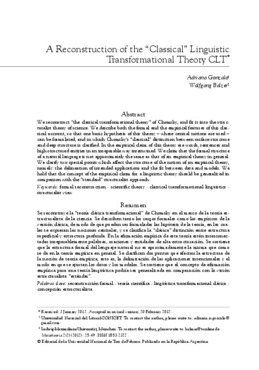Mostrar el registro sencillo del ítem
A reconstruction of the "classical" linguistic transformational theory CLT
| dc.creator | Gonzalo, Adriana | es |
| dc.creator | Balzer, Wolfgang | es |
| dc.date.accessioned | 2020-09-28T13:22:59Z | es |
| dc.date.available | 2020-09-28T13:22:59Z | es |
| dc.date.issued | 2012-04 | es |
| dc.identifier.citation | Gonzalo, A. y Balzer, W. (2012). A reconstruction of the “classical” linguistic transformational theory CLT. Metatheoria, 2(2), 25-49. | es |
| dc.identifier.issn | 1853-2322 (impresa) | es |
| dc.identifier.issn | 1853-2330 (en línea) | es |
| dc.identifier.uri | http://ridaa.unq.edu.ar/handle/20.500.11807/2409 | es |
| dc.description | Fil: Gonzalo, Adriana. Universidad Nacional del Litoral; Argentina. | es |
| dc.description | Fil: Gonzalo, Adriana. Consejo Nacional de Investigaciones Científicas y Técnicas; Argentina. | es |
| dc.description | Fil: Balzer, Wolfgang. Ludwig-Maximilians-Universität München; Alemania. | es |
| dc.description.abstract | We reconstruct “the classical transformational theory” of Chomsky, and fit it into the structuralist theory of science. We describe both the formal and the empirical features of this classical account, so that one basic hypothesis of this theory – where central notions are used – can be formulated, and in which Chomsky’s “classical” distinction between surface structure and deep structure is clarified. In the empirical claim of this theory are words, sentences and high-structured entities in an inseparable way intertwined. We claim that the formal structure of a natural language is not approximately the same as that of an empirical theory in general. We clarify two special points which affect the structure of the notion of an empirical theory, namely: the delineation of intended applications and the fit between data and models. We hold that the concept of the empirical claim for a linguistic theory should be generalized in comparison with the “standard” structuralist approach. | en |
| dc.description.abstract | Se reconstruye la “teoría clásica transformacional” de Chomsky en el marco de la teoría estructuralista de la ciencia. Se describen tanto los rasgos formales como los empíricos de la versión clásica, de modo de que puedan ser formuladas las hipótesis de la teoría, en las cuales se expresan las nociones centrales, y se clarifica la “clásica” distinción entre estructura superficial y estructura profunda. En la afirmación empírica de esta teoría están interconectadas inseparablemente palabras, oraciones y entidades de alta estructuración. Se sostiene que la estructura formal del lenguaje natural no es aproximadamente la misma que como se da en la teoría empírica en general. Se clarifican dos puntos que afectan la estructura de la noción de teoría empírica, esto es, la delimitación de las aplicaciones intencionales y el modo en que se ajustan los datos y los modelos. Se sostiene que el concepto de afirmación empírica para una teoría lingüística podría ser generalizada en comparación con la visión estructuralista “estándar”. | es |
| dc.format | application/pdf | es |
| dc.language | eng | es |
| dc.publisher | Universidad Nacional de Quilmes | es |
| dc.publisher | Universidad Nacional de Tres de Febrero | es |
| dc.rights | https://creativecommons.org/licenses/by-nc-nd/2.5/ar/ | es |
| dc.source | Metatheoria | es |
| dc.subject | Gramática transformacional | es |
| dc.subject | Linguística | es |
| dc.subject | Estructuralismo | es |
| dc.subject | Teorías científicas | es |
| dc.subject | Chomsky, Noam | es |
| dc.subject | Transformational grammar | en |
| dc.subject | Linguistics | en |
| dc.subject | Scientific theories | en |
| dc.subject | Structuralism | en |
| dc.subject | Linguística | pt |
| dc.subject | Teorias científicas | pt |
| dc.subject | Estruturalismo | pt |
| dc.title | A reconstruction of the "classical" linguistic transformational theory CLT | en |
| dc.type | info:ar-repo/semantics/artículo | es |
| unq.blm.ubicacion | P-AR-MET1 | es |
| unq.articulos.paginicio | 25 | es |
| unq.articulos.pagfinal | 49 | es |
| unq.revista.numero | 2 | es |
| unq.revista.volumen | 2 | es |
| unq.version | info:eu-repo/semantics/publishedVersion | en |
| unq.articulos.seccion | Artículos | es |
| unq.tipo.snrd | info:eu-repo/semantics/article | en |
| unq.acceso | info:eu-repo/semantics/openAccess | en |
Ficheros en el ítem
Este ítem aparece en la(s) siguiente(s) colección(ones)
-
Vol. 02, no. 02
Publicada en abril de 2012.

